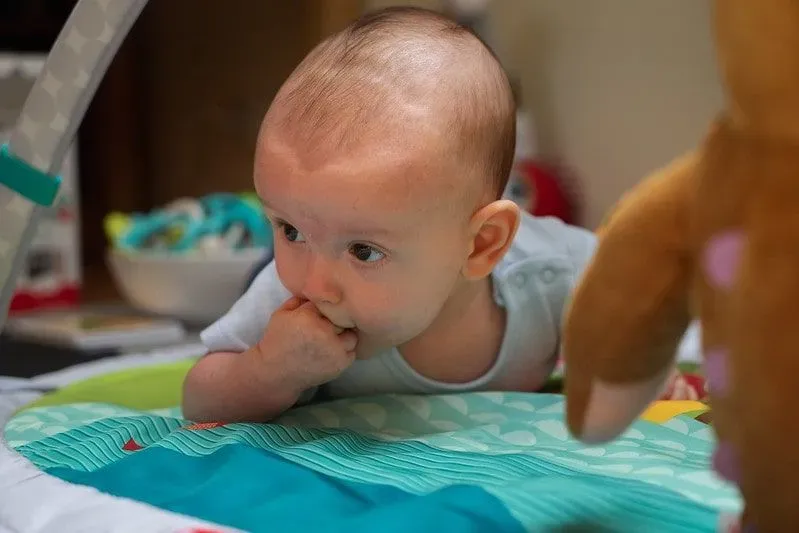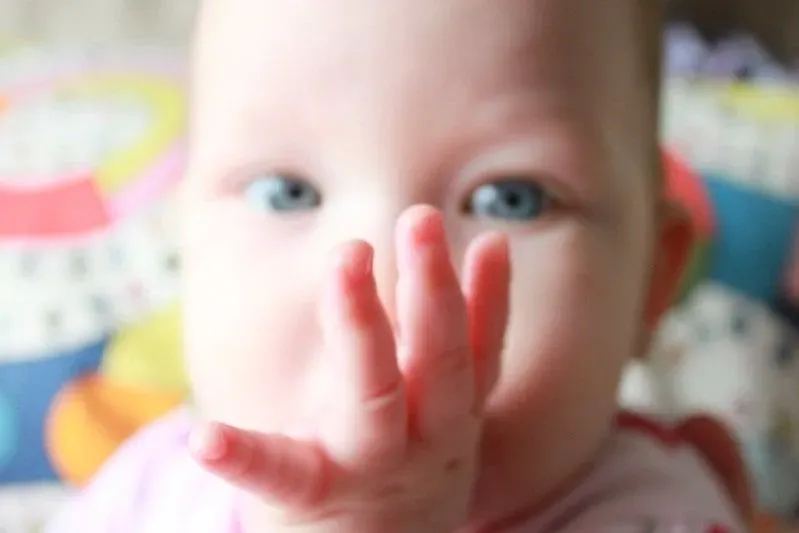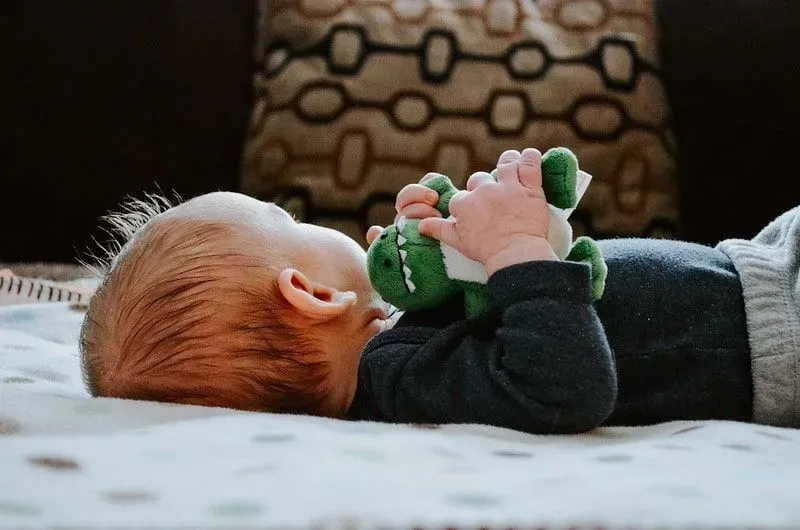Why Does My Baby Chew on His Hand
Epitome © Victoria Borodinova, pexels.com
Babies and infants are unpredictable at the best of times, and understanding their non-exact cues can be quite a chore.
With their different moods, behaviours and changing habits, it can oftentimes be a claiming to figure out what they all hateful. As the popular saying goes, 'babies don't come with a manual', and it really is well-nigh trial and error!
A mutual behaviour, which can be baffling at times, is when babies first chewing on their hands. Once your newborn discovers their easily, this becomes a new 'play' thing to focus on. And experts propose that putting hands or fists in the mouth is another step in self discovery, learning how they work and what they can exercise. Not to mention the countless dribbling caused by their favourite habit. This is all function of their sensory development.
However, excessive hand-chewing could also be a betoken for other things. While this may be concerning for parents, your baby chewing on fingers is ordinarily nothing to worry nigh. And so, if you're wondering near your babe's fascination with 'eating' their hands, here are some useful answers to your questions!
Hunger Cues: Are They Hungry?
Effectually vi to eight weeks old, a newborn sucking fingers could be a signal they are hungry. The first thing to practice is to check whether they're open to taking your breast milk or a bottle when offered. If they stop chewing their hands after their feed, then hunger was well-nigh likely the reason. Other possible hunger cues to look out for include, crying, smacking or licking their lips, or flailing their arms around. However, if they turn down food and then it could hateful other things.
A Whole New Globe: Are They Curious?
When babies suck on their hands or put objects in their mouths, it's oftentimes more about feeding their curiosity! By exploring objects with their mouths and tongues, this helps them learn more most their world, and what is in it. It besides allows them to communicate their needs, develop preferences and current states of development.

Teething Time: Are They Getting Their Milk Teeth?
A common reason for babies chewing on their hands could be teething. Only before six months of age, their gums become tender in grooming for their first tooth eruption. This discomfort causes babies to suck on their easily, scratch their gums or bite down on dissimilar things. That'south the quickest way for your fiddling ane to find relief!
Other signs and symptoms of teething includes, increased drooling, swollen gums, fussiness, sleepless nights and loss of ambition. Typically, babies don't show signs of teething until almost 4 to 7 months, but you might see your little one chewing on their easily much earlier.
Cocky-Soothing: Are They Seeking Comfort?
Babies might simply take comfort from chewing on their hands as a class of self-soothing. This often happens when they're over-stimulated and demand to calm down or falling asleep. Likewise, when they're bored and take cypher to appoint with, exploring their hands of a sudden seems more appealing! In one case once again, this is no need to worry, and it'southward a sign of healthy development.
Medical Issues: Exercise They Have Oral Thrush?
In rare cases, excessive hand chewing might exist a sign of oral thrush. Thrush in newborns is when too much of a yeast called Candida albicans grows inside a infant's mouth. This bacteria and fungi naturally grows in our bodies, and our immune system helps to keep these germs at bay. Only newborns and babies practise non accept fully formed allowed systems. Other symptoms to await out for include a whitish sheen to their saliva, refusing to nurse, and creamy white spots or patches in the mouth and tongue. When this happens, you lot should contact your doc who will advise on the best course of treatment for their age. It goes without saying that if you are always concerned well-nigh your babe's wellness to seek medical advice immediately.

Practice I Need To Do Anything To Help?
More often than not, chewing on hands is not a major cause of business concern. But if you are worried when your baby shoves their fist into their rima oris, you can attempt and bandy it for a toy instead. This volition entice your baby to catch it, significant he/she volition larn to take their hand out of their mouth. It'southward probably all-time to opt for a soft toy that is washable and of course chewable! Other options include soothing teething rings, and ones which are filled with water can exist chilled in the refrigerator. The cool water can help salvage sore teething gums, and keep your baby occupied. There are also natural teething gels on the market place that can numb their gums and help to salve symptoms.
When Do Babies Commonly Finish?
Every child is different, and volition eventually learn to stop chewing their easily in their own time. Some infants may naturally move onto dummies or sucking their thumbs for comfort. If your baby seems quite happy and content chewing on their hands, you don't have to take any action. In fact, you can normally take it as a healthy sign that they're expressing marvel and learning control over their own bodies!

When your child is around 18–24 months old, you may have an easier time trying to suspension this habit. But if you lot're actually concerned always seek medical advice from your practitioner.
In most cases though, information technology'southward perfectly normal and your baby should grow out of it with time. Just be prepared for the drooling and mountain of moisture clothes that comes with it!
Why Does My Baby Chew on His Hand
Source: https://kidadl.com/articles/baby-chewing-on-hands-this-might-be-why